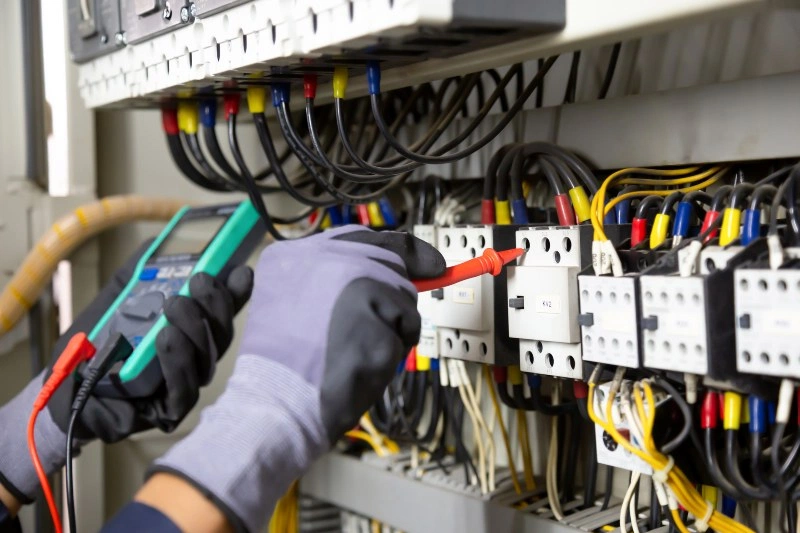Electrical safety inspections are a crucial component of maintaining a safe home environment. These assessments identify hazards such as faulty wiring, which can lead to serious accidents. Regular inspections guarantee compliance with established safety standards and protect families from potential dangers. Additionally, the importance of these evaluations extends beyond individual homes, influencing community well-being. Understanding the nuances of electrical safety can empower homeowners to take proactive steps in safeguarding their families and neighborhoods.
Key Takeaways
- Electrical safety inspections identify hazards such as faulty wiring and outdated systems, preventing potential accidents in homes.
- Regular inspections enhance energy efficiency, leading to lower utility bills for homeowners and fostering community financial well-being.
- Homes older than 20 years or those undergoing renovations should have annual inspections to ensure ongoing safety and compliance.
- Hiring licensed electricians for inspections ensures qualified evaluations and adherence to safety standards, promoting community responsibility.
- Educating family members about electrical safety and proactive measures contributes to a safer home environment and overall neighborhood well-being.
Understanding Electrical Hazards in the Home
Electrical hazards in the home represent a significant risk that can lead to serious injuries or even fatalities. Common dangers include overloaded outlets, frayed wires, and improper use of extension cords. These issues often stem from a lack of awareness about electrical systems and their maintenance needs. Understanding these hazards is essential for fostering a safe living environment. The importance of electrical safety inspections cannot be overstated, as they identify potential risks before they escalate into emergencies. Regular inspections by qualified professionals not only guarantee compliance with safety codes but also promote community well-being. By prioritizing electrical safety, families can cultivate a sense of belonging, knowing they have taken proactive steps to protect their loved ones from avoidable dangers.
Key Benefits of Electrical Safety Inspections
While many homeowners may overlook the necessity of regular evaluations, the key benefits of electrical safety inspections are profound and far-reaching. These inspections identify potential hazards, such as faulty wiring or outdated electrical systems, that could lead to fires or electrical shocks. By addressing these issues proactively, homeowners can considerably reduce the risk of accidents, ensuring a safer living environment for their families. In addition, electrical safety inspections can enhance energy efficiency, ultimately lowering utility bills. They also provide peace of mind, knowing that one’s home adheres to safety standards. Regular evaluations foster a sense of community responsibility, as safe homes contribute to the overall well-being of neighborhoods. Emphasizing the importance of electrical safety inspections can help cultivate a culture of safety.

How Often Should You Schedule an Inspection?
How frequently should homeowners prioritize electrical safety inspections to guarantee their living environment remains secure? It is generally recommended to schedule an inspection every three to five years, depending on the age of the home and the condition of its electrical system. However, certain circumstances may necessitate more frequent evaluations.
- Homes older than 20 years may require annual inspections.
- If significant renovations or additions are made, an inspection is advisable.
- Any signs of electrical issues, such as flickering lights or tripped breakers, should prompt an immediate inspection.
Choosing the Right Professionals for Electrical Inspections
When it comes to ensuring the safety and reliability of a home’s electrical system, selecting the right professionals for electrical inspections is essential. Homeowners should prioritize hiring licensed electricians with specialized training in electrical safety inspections. Credentials, such as certifications and affiliations with recognized industry organizations, can serve as indicators of expertise. In addition, reading reviews and seeking recommendations from trusted sources can help identify reputable professionals. It’s also beneficial to inquire about their experience with similar properties and any additional services they offer. Ultimately, choosing qualified inspectors not only enhances the safety of the electrical system but also fosters a sense of community well-being, reinforcing the importance of electrical safety inspections in maintaining a secure living environment.
Steps to Enhance Electrical Safety in Your Home
Guaranteeing a safe electrical environment within a home goes beyond hiring qualified inspectors; it involves implementing proactive measures to enhance overall safety. Homeowners can adopt several strategies to minimize electrical hazards and guarantee their families are secure.
- Regularly check outlets and cords for fraying or damage, replacing them as necessary to prevent shocks or fires.
- Install ground fault circuit interrupters (GFCIs) in areas prone to moisture, such as kitchens and bathrooms, to immediately cut off electricity during a fault.
- Educate family members about the safe use of electrical appliances and the importance of reporting any issues, fostering a community of awareness and responsibility.
Frequently Asked Questions
What Are Common Signs That Indicate I Need an Inspection?
Common signs indicating a need for an inspection include frequent circuit breaker trips, flickering lights, outlet discoloration, burning smells, and outdated wiring. Recognizing these issues can prevent hazards, ensuring a safer home environment for all.
Can I Perform My Own Electrical Safety Inspection?
While individuals can conduct basic visual assessments, a professional electrical safety inspection is essential for thorough evaluation. Trained experts possess the knowledge to identify hidden hazards, ensuring ideal safety within the home and community.
How Much Do Electrical Safety Inspections Typically Cost?
Electrical safety inspections typically cost between $200 to $500, depending on the property’s size and location. This investment guarantees compliance with safety standards, reducing risks and fostering a secure environment for families and communities alike.
Are Electrical Safety Inspections Required by Law?
Electrical safety inspections are often required by law, depending on local regulations and building codes. Compliance guarantees safety standards are met, protecting residents from potential hazards related to faulty wiring and electrical systems.
What Should I Do if My Inspection Finds Issues?
If an inspection reveals issues, the individual should promptly contact a licensed electrician for repairs. Addressing electrical problems swiftly guarantees safety, prevents hazards, and fosters a secure environment for family and community well-being.
Conclusion
In summary, prioritizing electrical safety inspections is essential for safeguarding homes and communities alike. By systematically identifying and addressing potential hazards, these inspections not only protect families from accidents but also promote compliance with safety regulations. Regular evaluations cultivate a culture of responsibility and awareness, ultimately enhancing the overall well-being of neighborhoods. Emphasizing electrical safety as a fundamental aspect of home maintenance guarantees a secure environment for all residents, laying the foundation for a healthier, safer community.
You May Also Like To Read:




